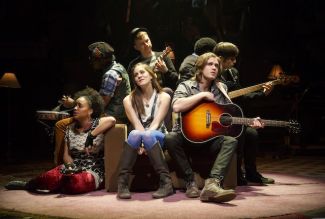The Correspondent, written by Ken Urban and directed by Stephen Bracket, is an off-Broadway drama. The play is running at The Rattlestick PLaywrights Theatre in the West Village from Jan. 19 until Mar. 16. The entire play takes place in the home of Phillip, a recently widowed, grieving husband. He refuses to make any changes to his home since his wife Charlotte died, which is why the set is a disorderly living room and dining area.
Phillip hires a dying woman, Maribelle, to deliver a message to his deceased wife in the afterlife. Over the course of the play, the audience assesses the complexity of themes like marriage, love and forgiveness.
When Philip begins to receive letters describing events and conversations that only his wife could know, he must determine if the correspondence is from a con artist or if his wife has returned from the grave. Amidst a burgeoning romance and the potential of a fresh start with Maribelle, he is faced with the challenge of distinguishing the true nature of the letters, which form the connection to his wife that he craves.
The ever-present emotional turmoil and vulnerability is coupled with sexual expression and liberation. In an interview conducted by the Rattlestick Playwrights Theater, Urban cites anger as his inspiration for the play in regards to social attitudes and justice. He recalls that he was at a play where there were two male actors kissing, and the man seated next to him refused to look. “I had this fantasy—I hope he wakes up tomorrow and his wife is a man,” he said.
This may not be the right play for people who would be uncomfortable watching a play with several sexually graphic scenes, whether heterosexual or same-sex. That aside, this is a great, inexpensive outing for any theater lover or budgeting college student.
Also, the resolution of the play is up for interpretation, based on whether or not you believe in the supernatural. There is also the question about the legitimacy of Phillip’s narrative perception as a result of his drinking. As my friend and I exited the theater, we could hear other audience members having a very similar discussion, which demonstrates the memorable, thought-provoking nature of this theater experience.





